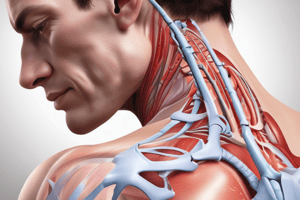Podcast
Questions and Answers
What is the primary cause of shoulder impingement?
What is the primary cause of shoulder impingement?
- Repetitive overhead movements (correct)
- Poor posture or muscle imbalances
- Weak or tight rotator cuff muscles
- Bone spurs or other anatomical variations
Which stage of impingement is characterized by thickening and scarring of the tendons?
Which stage of impingement is characterized by thickening and scarring of the tendons?
- Stage 1
- Stage 4
- Stage 3
- Stage 2 (correct)
What is the primary goal of conservative management in treating shoulder impingement?
What is the primary goal of conservative management in treating shoulder impingement?
- To improve posture and body mechanics
- To remove bone spurs
- To repair rotator cuff tears
- To reduce pain and inflammation (correct)
What is the role of physical examination in diagnosing shoulder impingement?
What is the role of physical examination in diagnosing shoulder impingement?
What is a common symptom of shoulder impingement?
What is a common symptom of shoulder impingement?
What is a recommended method for preventing shoulder impingement?
What is a recommended method for preventing shoulder impingement?
Study Notes
Definition and Causes
- Shoulder impingement: a common condition where the tendons of the rotator cuff muscles become irritated and inflamed as they pass through the shoulder joint.
- Causes:
- Repetitive overhead movements (e.g., sports, heavy lifting)
- Poor posture or muscle imbalances
- Weak or tight rotator cuff muscles
- Bone spurs or other anatomical variations
Symptoms
- Pain or aching in the shoulder or upper arm
- Pain worsens with overhead activities or lifting
- Weakness or fatigue in the arm
- Difficulty sleeping due to shoulder pain
Stages of Impingement
- Stage 1: inflammation and swelling of the tendons
- Stage 2: thickening and scarring of the tendons
- Stage 3: rotator cuff tears or complete rupture
Diagnosis
- Physical examination: shoulder mobility, strength, and pain assessments
- Imaging: X-rays, MRI, or ultrasound to rule out other conditions
Treatment
- Conservative management:
- Rest and ice
- Physical therapy to strengthen rotator cuff muscles and improve posture
- Pain management with medication or injections
- Surgical intervention:
- Arthroscopic surgery to remove bone spurs or repair rotator cuff tears
- Open surgery for more severe cases
Prevention
- Maintain proper posture and body mechanics
- Engage in regular exercises to strengthen rotator cuff muscles
- Avoid repetitive overhead activities or take regular breaks
- Use proper lifting techniques to avoid putting excessive strain on the shoulder joint
Definition and Causes
- Shoulder impingement occurs when rotator cuff muscles' tendons become irritated and inflamed as they pass through the shoulder joint.
- Repetitive overhead movements, such as those in sports or heavy lifting, can cause shoulder impingement.
- Poor posture or muscle imbalances can lead to shoulder impingement.
- Weak or tight rotator cuff muscles contribute to the development of shoulder impingement.
- Bone spurs or other anatomical variations can also cause shoulder impingement.
Symptoms
- Pain or aching in the shoulder or upper arm is a common symptom of shoulder impingement.
- Pain worsens with overhead activities or lifting in individuals with shoulder impingement.
- Weakness or fatigue in the arm is a symptom of shoulder impingement.
- Difficulty sleeping due to shoulder pain is often experienced by individuals with shoulder impingement.
Stages of Impingement
- In Stage 1, inflammation and swelling of the tendons occur.
- In Stage 2, thickening and scarring of the tendons happen.
- In Stage 3, rotator cuff tears or complete rupture occur.
Diagnosis
- Physical examination is used to assess shoulder mobility, strength, and pain.
- Imaging techniques, such as X-rays, MRI, or ultrasound, are used to rule out other conditions.
Treatment
- Conservative management involves resting and icing the affected area.
- Physical therapy is used to strengthen rotator cuff muscles and improve posture.
- Pain management is done using medication or injections.
- Arthroscopic surgery is used to remove bone spurs or repair rotator cuff tears.
- Open surgery is used for more severe cases of shoulder impingement.
Prevention
- Maintaining proper posture and body mechanics helps prevent shoulder impingement.
- Engaging in regular exercises to strengthen rotator cuff muscles prevents shoulder impingement.
- Avoiding repetitive overhead activities or taking regular breaks helps prevent shoulder impingement.
- Using proper lifting techniques to avoid putting excessive strain on the shoulder joint prevents shoulder impingement.
Studying That Suits You
Use AI to generate personalized quizzes and flashcards to suit your learning preferences.
Description
Test your knowledge about shoulder impingement, a common condition that occurs when the tendons of the rotator cuff muscles become irritated and inflamed. Learn about the causes, symptoms, and more.




